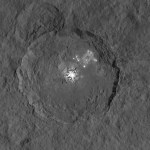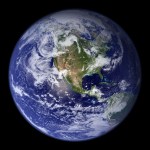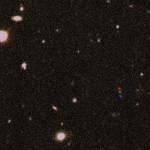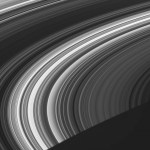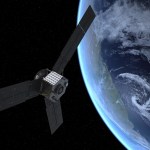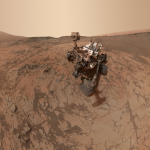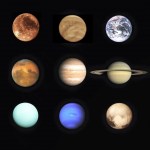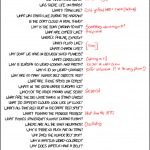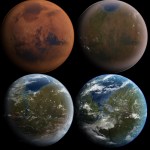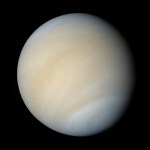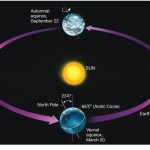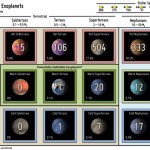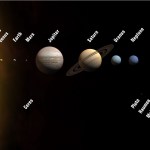Solar System
“Bringing an asteroid back to Earth? What’s that have to do with space exploration? If we were moving outward from there, and an asteroid is a good stopping point, then fine. But now it’s turned into a whole planetary defense exercise at the cost of our outward exploration.” -Buzz Aldrin
What causes those mysterious bright spots on the Solar System's largest asteroid? Although those bright, highly-reflective features at the bottom of Occator crater on Ceres were what first jumped out at us, subsequent imaging has revealed that these features are present in many other (but not all!)…
“Whenever I gaze up at the moon, I feel like I’m on a time machine. I am back to that precious pinpoint of time, standing on the foreboding — yet beautiful — Sea of Tranquility. I could see our shining blue planet Earth poised in the darkness of space.” -Buzz Aldrin
If you look at Earth from space, you'll find that we're a blue planet. You might chalk that up to the fact that our sky is blue, the sky is the outermost layer of our planet, and hence the planet appears blue. But then why do the continents and clouds appear to be such different colors, and why is the "blue" of the ocean such…
“The great oak of Astronomy has been felled, and we are lost without its shadow.” –Subrahmanyan Chandrasekhar, on the passing of Jan Oort
In our Solar System, we have the inner, rocky worlds, an asteroid belt, the gas giants and then the Kuiper belt. Out beyond that, in theory, we have the Oort cloud, where a few of the longest-period comets come from.
Image credit: Wikimedia Commons user fir0002, from http://flagstaffotos.com.au/.
Due to its tremendous distance -- the Kuiper belt ends at just 50 A.U. -- we weren't able to find Oort cloud objects in situ for all of the 20th…
“This then, I thought, as I looked round about me, is the representation of history. It requires a falsification of perspective. We, the survivors, see everything from above, see everything at once, and still we do not know how it was.” -W.G. Sebald
From their discovery in the 1600s, Saturn's rings have been a source of wonder and puzzlement to skywatchers everywhere. The only ring system visible through most telescopes from Earth, Saturn's main rings at more than 70,000 km long, yet no more than 1 km in thickness.
Image credit: NASA/JPL/Space Science Institute.
Once thought to have only…
“It is marvelous indeed to watch on television the rings of Saturn close; and to speculate on what we may yet find at galaxy’s edge. But in the process, we have lost the human element; not to mention the high hope of those quaint days when flight would create ‘one world.’ Instead of one world, we have ‘star wars,’ and a future in which dumb dented human toys will drift mindlessly about the cosmos long after our small planet’s dead.” -Gore Vidal
And yet, it isn't just the rings of Saturn that fascinate us, nor can we simply "watch them on television," as Gore Vidal sadly declared. Every…
Every time you follow the motion of a spacecraft, moon, planet or other object through the Solar System, you're putting the theory of gravity to the test. On one hand, there's a robust set of predictions for what the behavioral motion of these bodies ought to be, while on the other there's what we actually observe. Sometimes, a mismatch indicates the need for something new, like a new planet or a new law of gravity.
Image credit: Sky & Telescope.
But other times, there are mundane explanations that account for these "apparent" discrepancies, such as radioactive decay, heating from…
“Men of genius are often dull and inert in society; as the blazing meteor, when it descends to earth, is only a stone.” -Henry Wadsworth Longfellow
And yet, not all meteors nor all meteor showers are created equal. Some showers are duds, with the meteors being infrequent, inconsistent, short-lived and dim. Hardly worth mentioning. On the other hand, meteor showers can be spectacular, with frequent events, consistent displays year-to-year, lasting many consecutive nights and with bright, luminous fireballs.
Image credit: David Kingham 2013 | The National Maritime Museum.
The Perseids,…
“Studying whether there’s life on Mars or studying how the universe began, there’s something magical about pushing back the frontiers of knowledge. That’s something that is almost part of being human, and I’m certain that will continue.” -Sally Ride
When you travel some hundred-million kilometers through space to land, softly, on another world, you deserve a little bit of credit. The Mars Curiosity Rover has lived up to its hype and its expectations since its 2012 landing, and has responded with not only some remarkable science, but perhaps the best images of the Red Planet's surface…
“Well, this is a thing unheard of. An Elf would go underground, where a Dwarf dare not. Oh, I’d never hear the end of it.” -Gimli, Lord of the Rings
When you think about the different elements present here on Earth, I hope you think about the different ways they bind together, combine, and add value to all we do. Extracting them is a great difficulty, as Uncle Tupelo will sing to you in their song,
Coalminers.
Image credit: Theodore Gray, via http://theodoregray.com/periodictable/Posters/index.posters.html.
For each pure element, there's an abundance in our Solar System that's relatively…
“What was scattered, gathers.
What was gathered, blows away.” -Heraclitus
When you're looking around in our Solar System, we've got the Sun at the center, the planets orbiting them, and then moons orbiting the planets in turn.
But why is that necessarily the limit? Couldn't we have "moonlets" or some other, smaller satellites orbiting the moons?
Image credit: Frank Hettick / Fine Art America, via http://fineartamerica.com/featured/jupiter-and-its-moon-lo-as-seen-fran….
It seems like there's no reason that shouldn't be the case, but yet we don't yet know of any in the Solar System. Is there…
“Words are the source of misunderstandings.” -Antoine de Saint-Exupéry
Back in 2006, the International Astronomical Union officially defined the word "planet" for the first time, claiming that as long as something met all three of the following criteria:
It was in hydrostatic equilibrium (pulled itself into a spherical/spheroidal shape under its own gravity),
It didn't orbit any other body larger than itself (i.e., wasn't a moon), and
Cleared its orbital path of all other major bodies,
then it got to be a planet.
Image credit: © 2015 The Johns Hopkins University Applied Physics…
“Don’t go around saying the world owes you a living. The world owes you nothing. It was here first.” –Mark Twain
You probably think you know the eight planets pretty well, don't you? Mercury, Venus, Earth, Mars, Jupiter, Saturn, Uranus and Neptune, in order, with the four rocky inner worlds circumscribed by the four gas giants. But can you identify which is which?
Image credit: NASA / Lunar and Planetary Laboratory.
It isn't so easy if you're just shown a picture of a portion of a world, though, or a few candidate images that look somewhat similar, but only one is of the world you…
“Put two ships in the open sea, without wind or tide, and, at last, they will come together. Throw two planets into space, and they will fall one on the other. Place two enemies in the midst of a crowd, and they will inevitably meet; it is a fatality, a question of time; that is all.” -Jules Verne
There are plenty of questions one can ask about our local neck-of-the-woods here. As it stands, the more we learn and discover, the more we realize there is to learn and be discovered. On Monday, xkcd asked some of the most compelling and puzzling questions there are to ask about our very own Solar…
“I remember as a kid having a balloon and accidentally letting the string go and watching it just float off and into the sky until it disappeared. And there’s something about that, even, that feels very much like what life is, you know, that it’s fleeting, and it’s temporal.” -Pete Docter
So, you want to colonize another world, do you? Want to send humans to go live somewhere new, on a habitable planet beyond Earth? Well you're not alone. But which planet will you choose? Will it be Mars, a smaller, colder, farther-out world than our own? Where perhaps you add a magnetic field, a thicker…
“Now, Venus is an extremely hostile environment, and as such presents a lot of challenges for a science fiction author who wants to create life there. However, as I began to research it more thoroughly, I found myself intrigued by the possibilities the world offers.” -Sarah Zettel
Of all the worlds in our Solar System, Venus is perhaps the most like Earth. It's the closest to us in size, in mass, in orbit, and in elemental content. The biggest difference, of course, is Venus' atmosphere.
Image credit: ESA/MPS, Katlenburg-Lindau, Germany / Venus Express.
Over 90 times as thick as Earth's…
“Soon the earth will tilt on its axis and begin to dance to the reggae beat to the accompaniment of earthquake. And who can resist the dance of the earthquake, mon?” –Peter Tosh
But it isn't true that the Earth's axial tilt will change, is it? Or rather, if it did, how would you know? Believe it or not, measuring the tilt of the Earth about its axis is one of the easiest things to do, and all you need to know is your latitude, which you can either measure during the equinox or look up absolutely anywhere...
Image credit: http://timeanddate.com/.
and then to perform one of the simplest…
“Movin’ right along.
You take it, you know best.
Hey, I’ve never seen the Sun come up in the West?” -The Muppet Movie
Few things in this world are as regular as sunrise and sunset. With the application of a little physics, you can predict exactly where and when the sun will rise or set from any location on Earth. Thus far, every world in our Solar System -- planet, moon and asteroid -- has had the exact same experience as us.
Image credit: NASA Ames / Dana Berry, of the LADEE spacecraft.
But out in the Kuiper belt, Pluto is different. The only known world in the Solar System where a…
“Hope is not the conviction that something will turn out well but the certainty that something makes sense, regardless of how it turns out.” -Vaclav Havel
When you take a look at the planets in our Solar System, one of the most striking features about them is that they all orbit in almost exactly the same plane.
Image credit: Joseph Boyle of quora, via http://www.quora.com/How-close-are-the-planets-of-our-solar-system-to-b….
It didn't have to be this way, of course; you could imagine a scenario where the planets swarmed in a great, random sphere around our central star. After all, gravity…
It's the simple formula we all know and recognize: inner, rocky worlds closest to the Sun, an asteroid belt farther out, and then gas giant worlds out beyond them. That's how our Solar System works, at any rate. But what about the other star systems in the Universe?
Confirmed planets as of September 2014. Credit: PHL @ UPR Arecibo.
We've finally got enough data to determine whether other planetary systems are like us or not, and if not, how common (or uncommon) our configuration actually is. But what's also interesting is that despite the tremendous computational power needed,…
When you think about our world and our place in the Solar System, you very likely think about Earth, spinning on its axis, with the Moon orbiting around it, and with the entire Earth-Moon system orbiting the Sun.
But did you know that all of it -- the Earth spinning on its axis, the Moon revolving around Earth, the Earth revolving around the Sun, and even the Sun spinning on its own axis -- spins in the same direction? If you floated "above" the north pole of Earth, everything would rotate counterclockwise. It makes you wonder, as one of Jillian Scudder's questioners did:
Do all…
